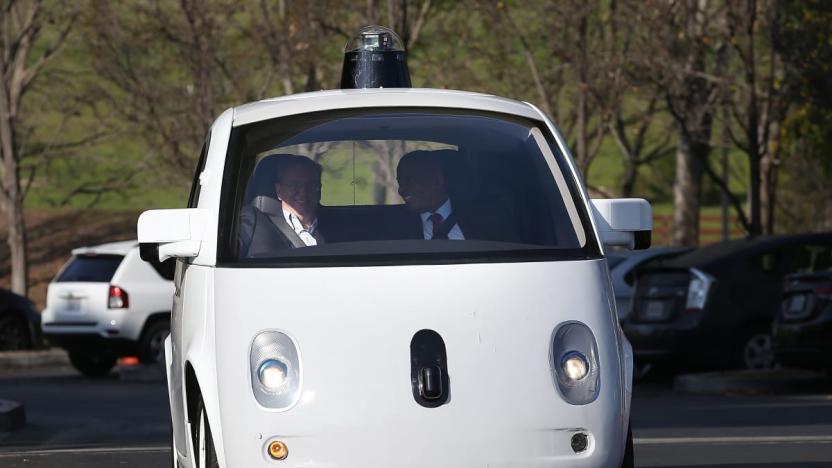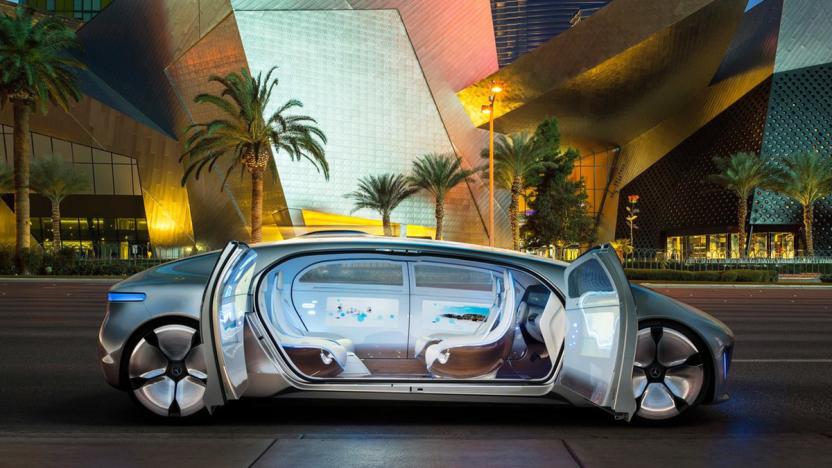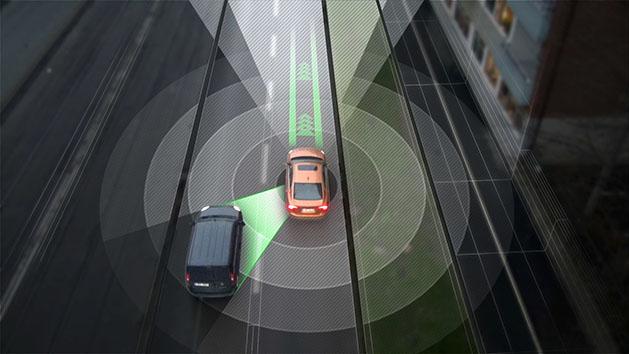selfdrivingcar
Latest

UK's first driverless 'pod' readies itself for public trials
Britain wants to be at the forefront of driverless car technology, so it's funding a handful of research projects that will look at different vehicle designs and how people react to them. One of those initiatives, led by Transport Systems Catapult and the RDM Group, is inching closer towards public trials today with the unveiling of a new "Lutz Pathfinder" pod. We first saw the vehicle back in February, covered with Union Jack decals, but that was actually just a prototype. The new two-seater pod unveiled this morning is far closer to completion -- it just needs to visit Oxford University's Mobile Robotics Group, where it'll be fitted with an autonomous control system. Researchers will then do a number of calibration tests on a private test track, before it's finally sent out for public testing in Milton Keynes.

TomTom's RoadDNA system helps anyone build a self-driving car
TomTom has launched RoadDNA, a product aimed at bringing self-driving car tech to more potential developers. The system captures 3D roadside data from depth sensing cameras and compares it to a database of images, letting vehicles know their exact position on the road, even at high speeds. The mapping company said it takes "vehicle data storage and processing limitations in mind," by converting the mass of 3D data it collects into a manageable, optimized 2D view of the road. TomTom said earlier that the RoadDNA database takes up just 25 Kb per kilometer of road.

Google hires auto industry veteran to run self-driving car project
Google already has someone running the technical side of its self-driving car project, but what about making sure the spreadsheets and such match up? That's a job for a serious business type, which is why the firm has hired auto industry veteran John Krafcik to become CEO of its autonomous vehicles division. Krafcik comes with some pedigree, having previously worked at Ford and ran Hyundai's US car business for five years. Those with long memories will recall that Krafcik was responsible for replacing owners manuals with a tablet in the Hyundai Equus, before reversing that decision a year later.

A new age of transportation is upon us and it's self-driving
We're on the cusp of change: Self-driving cars have begun to hit the streets with the goal of making transportation safer. The dream of a self-driving-car future, it would seem, is becoming a reality and it's been a long time in the making. A steady flow of engineers have, over the years, successfully chipped away at the problem of autonomous vehicles as the requisite technology's shrunk in scale and grown in capability. So what better time to look back at some milestones in autonomous-vehicle development than in the wake of this new age of transportation?

Google's unique self-driving cars hit the streets of Mountain View
Google has been testing self-driving cars on the roads of Mountain View for a while, but now the company's own models are hitting the streets. Last month, Google announced that its rather unique vehicles that were built specifically to drive themselves would begin testing on public roads this summer and now they're logging miles. During the trials, speeds are capped at 25 MPH and all of controls you'd usually find in a car (steering wheel, accelerator and brake pedal) are on-board in case the driver passenger needs to take over. However, these cars were designed to not have all of that stuff, so perhaps we'll see testing sans controls soon enough -- if the state of California allows, of course. The software that handles the navigating is the same tech that powered the company's fleet of Lexus SUVs outfitted to drive themselves. If you'll recall, that stable of vehicles tallied over a million miles, so the technology has quite a bit of road experience already.

NASA demos incredibly agile, remote-controlled EV
When we talk about the cars of the future, we're normally bandying around names like Google and Tesla. NASA's engineers at the Johnson Space Center might have just trumped those other names after unveiling its new Modular Robotic Vehicle prototype. While it may look like the world's dullest golf cart, the MRV is actually a futuristic EV that could serve as the test bed for future rovers, amongst other things.

China's tech giants are getting into the autonomous car business
Google and Tesla are squaring off against each other for the future of self-driving cars, so it's no surprise to see China's tech giants follow suit. Both Tencent and Baidu have announced that they'll be getting into the autonomous vehicle game in the last 24 hours. Tencent is teaming up with iPhone assembler Foxconn, as well as a local luxury car outfit, to create "smart vehicles."

Google ditched the steering wheel because people are unreliable
If you've ever wondered why Google decided to build its own car, well, you have at least part of your answer now. During a talk at SXSW, Astro Teller, the head of Google X, told the crowd that they decided to remove the steering wheel and brakes entirely because humans are not a "reliable backup" for the self-driving system. What does he mean exactly? Well, he believes that Google has already "mastered" highway driving. The company had put in hundreds of thousands of hours, autonomously cruising California freeways. The project had even reached the dog-fooding phase, in which Googlers test out the project in the real world. So employees that didn't work in the semi-secretive Google X division were essentially invited to beta test the vehicle and commute to work in a robot car -- under the condition that they pay very close attention and be the world's best bug reporters.

Elon Musk: Self-driving cars are the future
Self-driving cars are no longer fiction, but right now they're far from ubiquitous. That could change, however, if Elon Musk has his way. In a conversation with NVIDIA CEO Jen-Hsun Huang, the Tesla co-founder was bullish about the future of self-driving cars, saying that it's only a matter of time before the autonomous vehicle is commonplace. "You can't have a person driving a two-ton death machine," said Musk, imagining a world where manual driving would be outlawed as it could be considered too dangerous.

Google has some new friends working on its self-driving car
Apparently following the adage about keeping your friends close and (potential) enemies closer, the Automotive News World Congress in Detroit hosted Elon Musk last night and followed up today with Chris Urmson of Google. He's the director of its self-driving car project, and while there are no big-name car manufacturers lined up as partners yet, he did call out seven particular industry friends providing various parts for the latest prototypes. That includes LG (battery), Bosch (LIDAR), ZF Lenksysteme (steering gear), RCO, Continental and FRIMO, while Roush is helping to actually put it together here in the Detroit area. There are also NVIDIA chips inside, which Urmson said run mostly Linux software "with some other stuff happening." He confirmed that Google has talked to the usual list of big names (GM, Ford, Toyota, Daimler, etc.), and hopes cars are ready to go by 2020.

NASA and Nissan team up to on self-driving cars and space rovers
NASA and Nissan believe they've got a lot to learn from each other when it comes to autonomous vehicle technology. So, the two have decided to team up for the next five years and develop a self-driving system that they can use not just on Earth, but also in space. A team of scientists from both organizations will design an autonomous vehicle technology at the NASA Ames Research Center, home to Moffett Field, where Google is also testing its self-driving auto prototypes. The duo will start by conjuring up a fleet of zero-emission robotic cars, presumably modified Nissan Leafs, as that's exactly what's pictured above. They expect to start test driving the first one by the end of 2015.

Mercedes and LG keep drivers awake, brake cars automatically
CES 2015 is shaping up to be a big event for Mercedes-Benz, which will discuss its plans for self-driving cars in a keynote speech and show off a crazy prototype. LG has now revealed that it will supply the mono and stereo camera systems that will keep the cars in their lanes, dim the headlights, brake autonomously, and spot pedestrians or cyclists. The Korean company will also supply biometric systems to monitor the driver's eye movement and alertness, along with mobile and home entertainment expertise. Mercedes, in turn, will license part of its 6D Vision self-driving tech back to LG to use with other automakers.

Google needs partners to actually build its self-driving car
After helping push the entire automotive industry forward when it comes to autonomous driving, it appears Google is ready for some help with its own driverless cars. As the leader of the project told The Wall Street Journal, the folks in Mountain View aren't looking to replicate what Detroit-based and international automakers do best (build vehicles from the ground up). It's looking for an established player to help shoulder the load and bring the Google rides to market in the next five years. Until that happens, Chris Urmson says his team is partnering with automotive suppliers to move three generations beyond the cartoony-looking prototypes (pictured above) it has now. What's more, the search giant plans to on-road test this "beta one" fleet early next year. For California's sake, let's hope they're just as adept at sensing cyclists as their predecessors.

Tesla CEO promises a self-driving model for next year
Last night, Elon Musk told the world that Tesla was ready to reveal its "D" on October 9th, as well as preparing us for "something else" to expect along the way. But the CEO isn't done teasing just yet. In a recent interview with CNN Money, Musk let it be known that a Tesla car next year "will probably be 90 percent capable of autopilot," though he didn't dive into any specifics about which model(s) this comment was in reference to. "So 90 percent of your miles could be on auto. For sure highway travel," the Tesla boss added. Such a thing would be possible, Musk said, by combining different sensors with image-recognition cameras, radars and long-rage ultrasonics -- which, without a doubt, paints a bright picture for future vehicles from the company. "Other car companies will follow ... Tesla is a Silicon Valley company. I mean, if we're not the leader, then shame on us."

California issues permits for self-driving car trials on public roads
The first trio of companies looking to test self-driving cars on California's public roads got newly required permits from the state's Department of Motor Vehicles last week. Google nabbed paperwork for taking a fleet of 25 Lexus SUVs to the streets, while Audi and Mercedes-Benz also secured written approval that's now a must for trials amongst regular automobiles. The Guardian reports that other automakers are working on getting the proper approval for testing as well, so long as vehicles have a way for the driver to take control if needed. Of course, California has welcomed autonomous vehicles since 2012, but the state announced new rules for testing on public roads earlier this year that went into effect this month. In addition to the Golden State, Michigan, Nevada and Florida also allow self-driving trials on public roads. [Photo credit: Justin Sullivan/Getty Images]

California requires manual controls before Google's car hits public roads
One of the unique features inside Google's self-driving car is that it doesn't sport a steering wheel or a set of pedals. That won't fly on public roads in California though, so the folks in Mountain View are faced with adding them or sticking to closed-course testing. New regulations that go into effect next month require autonomous vehicles to let the driver take "immediate physical control" should the need arise. Google says it'll adhere to the rule by installing a temporary steering wheel and pedals in its 100 prototype cars set to begin testing on private roads in September.

Get a behind the scenes look at Google's self-driving car this Friday
If you've been itchin' for more info on Mountain View's compact self-driving car, you're in luck. At 11AM PT/2PM ET this Friday (August 1st), Google is hosting a live Hangout as the folks from Make take a behind the scenes look at the project for its summer camp series. The so-called Field Trip is said to have a gander at how the vehicles work and provide an update on recent developments. Those who plan on tuning in can submit specific queries in advance for the Q&A session, but even if you don't plan on posing a question, taking an early (or late) lunch seems like a solid choice.

FBI sees self-driving cars as 'lethal weapons' for criminal 'multitasking'
Google stirred up quite the buzz a few weeks back with its latest self-driving car design, but the FBI isn't convinced the tech advancements are in the public's best interest. In a report procured by The Guardian, the bureau warns that the autonomous vehicles even more of a "lethal weapon" than they are today, thanks to the capacity for felonious "multitasking." The argument is that criminals can deter their pursuers without the need to watch the highway. It's worth noting that the massive fleet of automobiles already on the road are pretty dangerous themselves. It's not all doom and gloom though, as the FBI's report sees easier surveillance of suspects and a reduction in the amount accidents related to distracted drivers or poor judgement.

Volvo's self-driving cars tackle merging, braking traffic in first road tests
Volvo has now joined Google and others by testing autonomous cars on public roads, in its hometown of Gothenburg, Sweden, no less. This is the first phase of its "Drive Me" project, and will be limited to semi-autonomous vehicles on 50km (30 miles) of set commuter routes. The vehicles have progressed to where they can now adapt their speeds, follow traffic and deal with merging vehicles, according to Volvo. That means drivers still need to give their undivided attention, but eventually, the automaker intends to have 100 fully autonomous vehicles on the road operating in an "Autopilot" mode. Volvo hopes to avoid the kind of collisions that its cars are famous for surviving by eliminating the main cause -- us.











